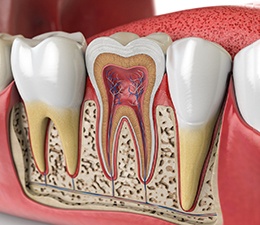Root Canal Therapy – Waterbury, CT
Effective Toothache Relief

Are you experiencing a severe toothache or an extreme sensitivity to hold and cold temperatures? These may indicate a dental infection, which will need to be treated immediately to preserve your pearly whites. Fortunately, our team at Waterbury Smiles can address this condition and alleviate tooth discomfort with root canal therapy. Not only will you return to having a comfortable smile, but you’ll also avoid the need to have your tooth extracted. Keep reading to learn more or reach out to us today to schedule your appointment!
Do I Need Root Canal Therapy?

A root canal infection usually occurs in teeth already chipped, cracked, fractured, or weakened by cavities or gum disease. Bacteria infiltrate the interior of the tooth and infect the nerves and pulp. Essentially, this means that the tooth will no longer be able to absorb nutrients to remain healthy, but the pain also subsides. Some patients mistakenly believe their tooth has improved. However, if left untreated, the infection can spread to other teeth or into your bloodstream. If you suspect a toothache may be indicative of a root canal infection, contact Waterbury Smiles today.
At our dental practice, we want to alleviate your toothache discomfort with root canal therapy in Waterbury. One of our caring dental team members will ensure that you’re completely relaxed during your treatment. Your comfort is our priority.
The Root Canal Process

When you visit our dentist in Waterbury for root canal treatment, we will thoroughly examine your tooth and the surrounding teeth and gums to determine the extent of the infection. For patients with a severe infection, we have to remove compromised tissue and administer a course of antibiotics before completing root canal treatment.
A root canal consists of four parts. First, a tiny opening is made in the tooth through which the infected pulp and nerves can be removed. Then, they are extracted, and the tooth's canals are cleaned out. The hollow area is then filled with gutta-percha, a biocompatible dental filling. Finally, your tooth is resealed, shaped, and restored to a natural look and feel.
Waterbury Smiles always wants to make sure you have the best smile possible. That’s why we often recommend the addition of a porcelain crown to protect and strengthen your treated tooth. Crowns help prevent further damage and diminish the possibility of reinfection.
The Benefits of Getting a Root Canal

By undergoing root canal therapy, you can expect to appreciate several essential benefits, including:
- A pain-free smile – With comfortable teeth, you can enjoy eating, talking, sleeping, and smiling without any dental pain.
- Keep serious issues at bay – Unchecked tooth infections can lead to tooth loss and other systemic health problems. A root canal can help prevent these complications as well as those that come with tooth extractions.
- Improve the look and feel of your tooth – Your smile will be free of infection, and the dental crown will help enhance the strength and appearance of your tooth.
Understanding the Cost of Root Canals

So, you’re thinking of getting a root canal. That’s great to hear – the treatment could save your aching tooth! Still, you may worry the cost of root canal therapy exceeds your budget. However, the truth is that this procedure’s price varies by patient. As such, you must consult our dentists in person before you can get an exact treatment estimate. Fortunately, you can trust Waterbury Smiles to guide you through financing and make care affordable. Just keep reading or call our office for details on how that works!
Factors That Can Affect Root Canal Cost

Following an oral exam, our team will assess the factors that impact your root canal’s cost. These typically include the following:
- Tooth Type & Location: Different teeth have varying numbers of roots. As such, a root canal will cost more or less based on your tooth’s type and location. For example, the front ones have fewer roots than bicuspids or molars. They thus cost less than the latter kinds.
- Treatment Difficulty: If you need a root canal due to a severe infection, a specialist may need to see a specialist. In that case, your treatment expense will rise.
- Need for Extra Services: Sometimes, a root canal is followed by dental crown placement. If that applies to you, the costs will go up.
Is it Cheaper to Pull My Tooth?

Admittedly, tooth extraction does cost less upfront than a root canal. Many patients are thus tempted to skip the latter for the former. Even so, that choice is often a mistake.
Remember, there are long-term consequences to losing a natural tooth. Besides affecting your bite by making other teeth shift, it can also cause pain and eating difficulties. The resulting smile gap wouldn’t be a pleasant sight either.
Dentists often suggest restorations like dental implants or bridges to prevent these effects. Sadly, though, those prosthetics can get a bit pricey. That being the case, saving the tooth is usually more cost-effective than paying for a replacement. You shouldn’t delay that saving, too – the longer you wait, the likelier the tooth will need an extraction anyway.
Does Dental Insurance Cover Root Canal Therapy?

Root canal therapy is a major procedure, so most dental plans will partially cover it. More specifically, they’ll extend coverage to 50-80% of the cost after you pay the deductible.
Even so, there are exceptions. Every policy is different, after all. Therefore, confirm your plan’s benefits with your insurance company first. If you need help, our team can even assist you with this process.
Other Options for Making Root Canal Therapy Affordable

Of course, there’s no need to panic if you don’t have dental insurance. Other ways exist to make a root canal affordable. Many dental practices offer a variety of payment options.
Consider Waterbury Smiles, for instance. Our office offers flexible financing through CareCredit. This third-party service will let you pay for care with monthly, low-interest installments if you qualify. You could then pay for a root canal over time, not all at once.
Ultimately, Waterbury Smiles can help you get affordable root canal therapy. Don’t hesitate, then, to book a visit to our practice!
Root Canal FAQs
Why can’t the tooth just be extracted?
It’s not uncommon for patients to ask why their problem tooth cannot just be extracted. Wouldn’t that be easier? It depends. The reality is that it is always best to keep your natural teeth as long as possible. Even if they are damaged, if there is a solution that will help fix the problem and strengthen the tooth, it’s always better to avoid extraction and tooth replacement. The reason is that your regular teeth are far stronger and better for your oral health. While removal of the tooth might appear easier, it can lead to time-consuming and costly treatment down the road.
Is a root canal painful?
If you know someone who has undergone a root canal before claiming it caused immense pain, the discomfort they’re referring to is likely caused by the infection, not the procedure. A root canal is designed to eliminate the infection inside the tooth as well as the pain it is causing. Before the start of your procedure, you will receive local anesthesia to help you feel no discomfort while Dr. Marini completes the process. Afterward, you can expect some soreness and tenderness; however, he and his team will provide helpful aftercare instructions.
How successful are root canals?
You will be pleased to learn that root canals are considered to be extremely safe and successful. On average, the procedure has a success rate of 95% or higher. It is possible that by allowing your dentist in Waterbury to perform a root canal, you can enjoy your natural teeth for a lifetime (with proper maintenance).
What can I expect after a root canal?
When you return home after having a root canal, you can expect your tooth to feel more sensitive. This is common and will decrease over time; however, the inflammation of your tissue will be at its highest after the procedure, so you will need to take an over-the-counter pain reliever (i.e. Advil, Motrin, Aleve) to alleviate discomfort.
Since you will need to wait until your permanent dental crown is complete, it is advised that you avoid chewing on the side of your mouth with the temporary restoration. This will ensure your weakened tooth remains safeguarded against bacteria and food particles.
You will need to continue your regular oral hygiene routine by brushing and flossing, just be mindful of your surgical area and be gentle when caring for your smile.
How Long Does a Root Canal Take?
A root canal often doesn’t take weeks or even days. In fact, dentists can usually perform one in a single appointment. There are, however, cases where the therapy requires two visits. In these scenarios, the first session places antibacterial medicine in the tooth. The second session is when the treatment site is cleaned out.
As for the actual therapy, its length usually spans 30 to 90 minutes or more. The final timeline will depend on the treated tooth’s location and type. Molars, for example, have more roots than front teeth. The former teeth, thus, require more time to treat than the latter.
Do I Need Antibiotics Before or After My Root Canal?
You might think antibiotics are necessary before or after a root canal. In reality, however, most patients don’t need this medicine for the therapy. It doesn’t usually add to treatment effectiveness.
Ultimately, dentists only prescribe antibiotics for root canals in special cases. More specifically, they do so if treatment greatly risks causing an infection. The medicine, in that scenario, lowers your risk and makes therapy more effective overall.
To settle this matter, the dentist will review your medical history before treatment. Doing so helps them see if antibiotics would be helpful for you.
Can Root Canals Be Prevented?
As a matter of fact, yes – you can avoid needing a root canal at all. You just need to adopt proper oral habits. These typically include the following:
- Practice Good Oral Hygiene – You can prevent the need for a root canal by caring for your smile. To that end, brush twice daily, floss once daily, and rinse often with fluoridated mouthwash.
- See Your Dentist Often – With regular dental checkups and cleanings, a dentist lowers your risk of tooth infections. After all, these services keep bacteria from reaching a tooth’s pulp.
- Maintain a Healthy Diet – By limiting sugar intake and eating healthy foods, your teeth will be better protected from harmful bacteria.
Do Root Canals Ever Have to Be Redone?
True, root canal therapy does have a very high success rate. Even so, there’s still a small chance that the procedure will need redoing at some point.
A follow-up root canal, or endodontic retreatment, can stem from various factors. Saliva, for example, may contaminate your tooth during the initial procedure. On the other hand, there may have been a time delay between the first root canal and crown placement. It’s even possible that the dentist didn’t disinfect all the tooth’s roots.





